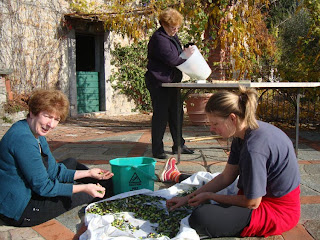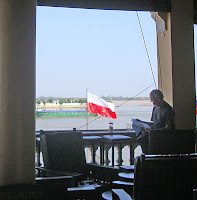
Snow fell in Italy before Christmas, in places where it doesn’t usually snow. Laura, who is 65 and has lived in this village for her whole life, can’t remember it ever snowing here - except perhaps the odd flake trickling down out of the sky on a very cold day. But just over a week ago, Tuscans - right down to the edge of the Mediterranean - came out of their houses to find the roads six inches deep in the white stuff. All great fun and very pretty. It only lasted a few days before it began to melt. And then on Christmas Eve it began to rain - and that’s where the trouble began.
Rain in the Tuscan Alps is never ordinary - you either get a light mizzle or you get the fully grown up version as seen in Hollywood movies with six fire hydrants trained on the set. So on Christmas Eve we stayed beside the fire and listened to it drumming on the roof and rushing down the gutters. Christmas Day was bright and dry and we didn’t have the TV on all day - or the computer. So when we went out on Boxing Day to take members of the family to Pisa Airport we were totally unprepared for what had happened.
Swollen with snowmelt and rain, all the local rivers, including the Serchio and the Arno, had broken their banks. The main autostrada to Pisa was underwater, the secondary ‘A’ road (SS Aurelia) was also flooded and the train line was under water too. The police had blocked off all the roads, but no one had thought to provide details of a diversion. We drove around for hours frustrated at every attempt by the flood water.
This isn't the river - this is a new channel cut by the flood across fields and through a raised flood dyke. Eventually we found a way through, by driving more than half way to Florence and then coming back across country in a nose-to-tail traffic jam that stretched for miles. We missed the plane, of course, and then had to find a way back. The route we had taken was closed by an accident, another was closed because the bridge was down ...... We made it home eventually, but a trip that would take 45 minutes each way normally, had taken us 8 and a half hours. Then, because their flight had been re-scheduled to the following day, we had to do it all again.....
Landslides up in the hills have caused even more problems, sweeping away roads that provide the only link for small communities. It will be months before the roads and railways are completely restored. The President of Tuscany has declared a state of emergency. It seems England isn’t the only country in Europe to have problems dealing with weather!
.jpg)














.jpg)







.jpg)
.JPG)
.JPG)
.jpg)
.jpg)





















